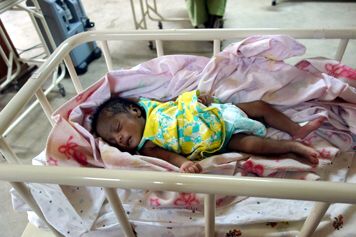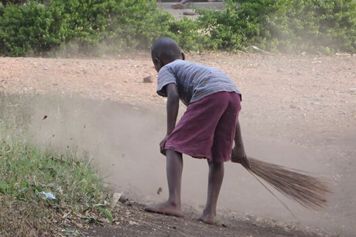Health
NOTDEC's "School Report"
When it comes to the health of the children, NOTDEC Uganda's report might say: "Better than other local kids. But should still try to improve."
Good in Parts
By the standards of rural Uganda, healthcare at NOTDEC Uganda is quite good. In part, this is because periodic interventions such as de-worming, head-shaving and immunization are firmly entrenched. A great deal more could be achieved by even simpler measures like hand-washing and better personal hygiene. But these require changes in daily habits, changes to lifestyle, sometimes changes to culture, making them harder to achieve. So, should the need arise, Kagando hospital is only 10 miles away!
Bitter Pill
Hospital treatment, however, isn’t free, and all patients must also be accompanied. Child and house mother must therefore be driven to Kagando and fed throughout their stay – costing yet more. So, reducing hospital admissions would mean healthier kids and save time and money.
 Simple Ways to Stay out of Hospital
Simple Ways to Stay out of Hospital
Many hospital visits are avoidable – eg for malaria, diarrhoea etc. NOTDEC Uganda really needed a qualified nurse on-site regularly to examine the children and treat any problems early. Now our nurse, Doreen, is in post, she is well-placed to introduce simple health measures — more care with mosquito nets, a different regime for use of the outside toilets (where mosquitos might breed) etc. She is also working with house mothers to encourage better personal hygiene, and can check regularly that key tasks like sterilizing babies bottles are being done properly.. Health education is a slow process requiring cultural change — change which a Ugandan like Doreen is best able to bring about. It must also help that she's on-site checking continually that no-one is going back to their old ways. It’s not rocket science – it just needs a proactive and determined approach. And Doreen is on the case!
 A Dusty Answer?
A Dusty Answer?
To European eyes, one of the key characteristics of Kabirizi is just how dusty it is – particularly in the dry season. Whether this poses much of a health problem is unclear. The locals expect it; so, for them, it's not an issue: the children are bathed regularly – end of story. When it's dry, however, the children play in the dust barefoot much of the time, and get filthy extremely quickly. Of course you can get dirty just doing a bit of gardening: dirt doesn't kill you, and most bacteria are harmless But, with chest infections, unspecified allergic reactions and fungal infections doing the rounds, it may at least be worth investigating whether NOTDEC's dust is something we should be concerned about.
Diet
A healthy and balanced diet is crucial to a healthy lifestyle. A few children admitted to NOTDEC had rotten teeth thanks to a previous poor diet high in sugar cane. By contrast, the NOTDEC Uganda diet is low in processed foods, sugar and fat; so most children suffer none of the “diseases of development” like obesity and tooth decay. Even so, Doreen has said that the diet would be improved by more fresh fruit, more protein, and more variety. And, as a result, the children are now routinely getting more protein with more steps planned to improve the diet further. NOTDEC Uganda’s farm also has the potential to help. Or the farm could be run to bring in money, which could be spent in part on better food. Either way, there is room for improving the diet at NOTDEC Uganda and that too will pay a health dividend.
Sting in the Tail
Spurring us all on is one simple aim: to make NOTDEC Uganda's children fitter and healthier than they are today.
